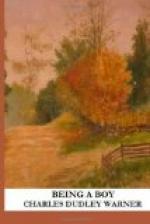without making a noise. A puff of wind comes
and ruffles the surface, so that he cannot see the
fish. It is calm again, and there he still is,
moving his fins in peaceful security. The boy
lowers his snare behind the fish and slips it along.
He intends to get it around him just back of the gills
and then elevate him with a sudden jerk. It is
a delicate operation, for the snare will turn a little,
and if it hits the fish, he is off. However,
it goes well; the wire is almost in place, when suddenly
the fish, as if he had a warning in a dream, for he
appears to see nothing, moves his tail just a little,
glides out of the loop, and with no seeming appearance
of frustrating any one’s plans, lounges over
to the other side of the pool; and there he reposes
just as if he was not spoiling the boy’s holiday.
This slight change of base on the part of the fish
requires the boy to reorganize his whole campaign,
get a new position on the bank, a new line of approach,
and patiently wait for the wind and sun before he
can lower his line. This time, cunning and patience
are rewarded. The hoop encircles the unsuspecting
fish. The boy’s eyes almost start from his
head as he gives a tremendous jerk, and feels by the
dead-weight that he has got him fast. Out he
comes, up he goes in the air, and the boy runs to
look at him. In this transaction, however, no
one can be more surprised than the sucker.
VII
FICTION AND SENTIMENT
The boy farmer does not appreciate school vacations
as highly as his city cousin. When school keeps,
he has only to “do chores and go to school,”
but between terms there are a thousand things on the
farm that have been left for the boy to do. Picking
up stones in the pastures and piling them in heaps
used to be one of them. Some lots appeared to
grow stones, or else the sun every year drew them to
the surface, as it coaxes the round cantelopes out
of the soft garden soil; it is certain that there
were fields that always gave the boys this sort of
fall work. And very lively work it was on frosty
mornings for the barefooted boys, who were continually
turning up the larger stones in order to stand for
a moment in the warm place that had been covered from
the frost. A boy can stand on one leg as well
as a Holland stork; and the boy who found a warm spot
for the sole of his foot was likely to stand in it
until the words, “Come, stir your stumps,”
broke in discordantly upon his meditations. For
the boy is very much given to meditations. If
he had his way, he would do nothing in a hurry; he
likes to stop and think about things, and enjoy his
work as he goes along. He picks up potatoes as
if each one were a lump of gold just turned out of
the dirt, and requiring careful examination.




